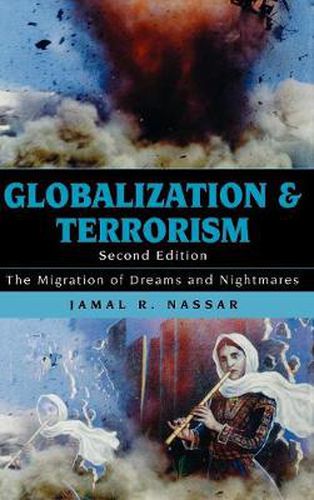Readings Newsletter
Become a Readings Member to make your shopping experience even easier.
Sign in or sign up for free!
You’re not far away from qualifying for FREE standard shipping within Australia
You’ve qualified for FREE standard shipping within Australia
The cart is loading…






Courageously stepping into charged terrain, this book casts a clear light on globalization and terrorism for what they are, not what some may wish them to be. Jamal R. Nassar carefully defines these twin concepts, placing them in historical as well as political context. Woven throughout the book is his central theme of the migration of dreams and nightmares. As some are able to take advantage of the opportunities of globalization, leaving others behind, they leave behind a legacy of unrealistic dreams. These unfulfilled hopes of the poor and oppressed often transform themselves into nightmares for the wealthy and powerful. This vicious cycle, the author argues, is often enhanced by globalization and effected by terrorism. Focusing on the key case studies of Palestine and Northern Ireland, Nassar applies their lessons to other examples of conflict including Iraq, Afghanistan, the Congo, Chechnya, and Colombia in order to internationalize our understanding of how globalization and terrorism operate in a range of situations. He also devotes a chapter to Islamist terrorism in a tour de force of incisiveness and balance. This book considers globalization and terrorism not only from the perspective of the major powers, but also introduces the views of those dominated by forces beyond their control. Yet even as the author offers a profound critique of Western hegemony, he conveys respect and hope for an enlightened global interdependence-embracing the power of the dream over the nightmare.
$9.00 standard shipping within Australia
FREE standard shipping within Australia for orders over $100.00
Express & International shipping calculated at checkout
Courageously stepping into charged terrain, this book casts a clear light on globalization and terrorism for what they are, not what some may wish them to be. Jamal R. Nassar carefully defines these twin concepts, placing them in historical as well as political context. Woven throughout the book is his central theme of the migration of dreams and nightmares. As some are able to take advantage of the opportunities of globalization, leaving others behind, they leave behind a legacy of unrealistic dreams. These unfulfilled hopes of the poor and oppressed often transform themselves into nightmares for the wealthy and powerful. This vicious cycle, the author argues, is often enhanced by globalization and effected by terrorism. Focusing on the key case studies of Palestine and Northern Ireland, Nassar applies their lessons to other examples of conflict including Iraq, Afghanistan, the Congo, Chechnya, and Colombia in order to internationalize our understanding of how globalization and terrorism operate in a range of situations. He also devotes a chapter to Islamist terrorism in a tour de force of incisiveness and balance. This book considers globalization and terrorism not only from the perspective of the major powers, but also introduces the views of those dominated by forces beyond their control. Yet even as the author offers a profound critique of Western hegemony, he conveys respect and hope for an enlightened global interdependence-embracing the power of the dream over the nightmare.